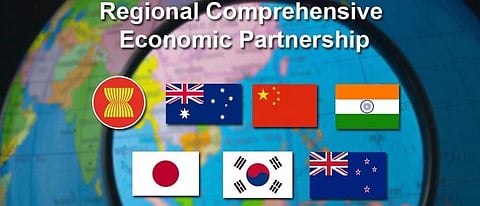

Farmer organisations from across India have called for protests in the coming days against the Regional Comprehensive Economic Partnership (RCEP), with some even threatening to block essential supplies.
Around 40 farmers organisations from 13 states under the banner of Rashtriya Kisan Mazdoor Sangh (RKMS) held a closed-door meeting in New Delhi on October 10, 2019 to chalk out their future strategy on RCEP.
Later, they addressed a press meet after which, they moved to Jantar Mantar, where they burnt an effigy of Union Minister of Commerce Piyush Goyal. The minister is currently in Bangkok, Thailand, for what appears to be the final round of negotiations on RCEP, before it finally gets signed in November.
RCEP is a proposed free trade agreement of 16 countries. It is being negotiated between the 10-member Association of Southeast Asian Nations or ASEAN, India, China, South Korea, Japan, Australia and New Zealand.
Shiv Kumar Sharma alias Kakka ji, national convener of RKMS, told reporters that farmer organisations will organise protests at every district headquarter on October 18 and submit memorandums to collectors against RCEP.
On November 2, farmers leaders have decided to block national highways in every state between 11 am and 2 pm. They will also submit memorandums to chief ministers of all states and reach out to Members of Parliament from opposition parties to raise the issue in Parliament.
“We have also decided to indefinitely block the supply of essential foods to cities across the country after November 2,” Sharma said, although he did not give a precise date.
On October 7, Prime Minister Narendra Modi took stock of the negotiations on RCEP. Officials close to the development have indicated that India will be a part of the agreement but with some safeguards and a number of caveats to protect domestic interests.
Farmer leaders have urged the prime minister to keep the agriculture sector away from RCEP.
Why the protests
At the press event on October 10, farmer leaders said in unison that if RCEP did materialise, Indian agriculture would be destroyed.
Under the agreement, import duties on agricultural produce would be reduced and cheap agriculture and dairy imports would flood the Indian market.
“The prosperity of India’s 80 million dairy farmers will be the primary target under this deal,” Sharma said.
India tops the world in milk production. Cheap dairy imports would reduce India’s milk production as small Indian farmers can hardly compete with multi-nationals.
Farmer leaders also said that an impression had been created through a malicious campaign that India was milk-scare and that Indians were drinking contaminated milk.
“But the NITI Ayog report clearly says that by 2033, India’s milk demand will be 292 million tonnes whereas production will be around 330 million tonnes,” KV Biju, a farmer leader from Kerala, said.
According to farmers leaders, under RCEP, cheap imports of dairy items, wheat and soya bean from Australia, dairy products from New Zealand, mango pulp, rice, dry fruits and apples from China as well as pulses and sugarcane from ASEAN countries would increase.
Sharma cited the example of a free trade agreement with Sri Lanka in the late 1990s, which impacted India’s chilli market.
“In 1999, an Indian farmer used to get Rs 720 on the production of one kilogram of chillies. But after the free trade agreement with Sri Lanka and the subsequent cheap imports of chillies from that country, farmers got just Rs 330 per kilogram,” Sharma said.
In the last five years, India’s agriculture exports have shown a declining trend.
“Our farmers, whose livelihood depends on agriculture, have the smallest land holdings on the planet. If such an agreement takes place, it would prove be the death-knell for millions of Indian farmers,” Sharma said.